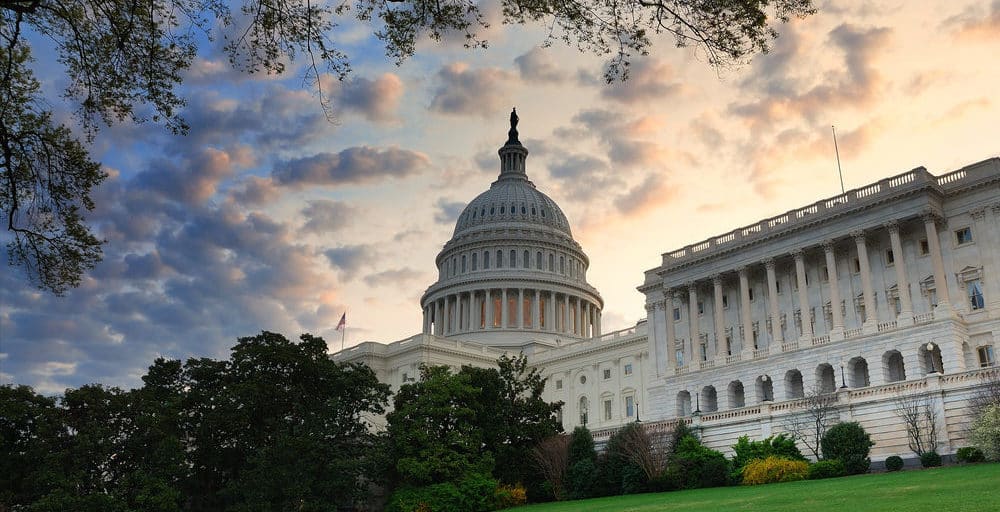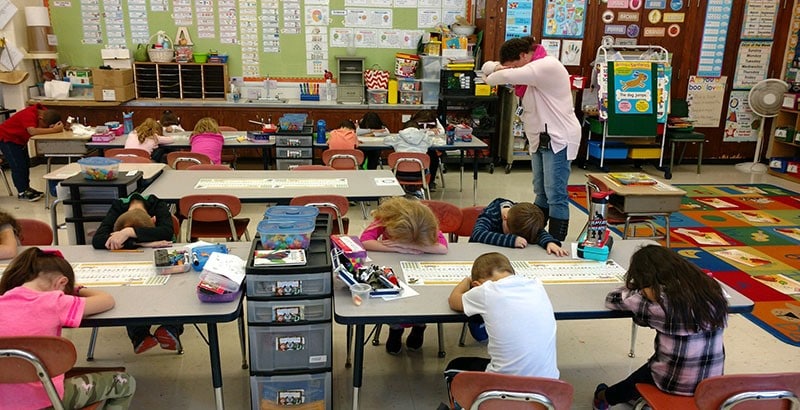13 Mar2020
AACTE Responds to COVID-19
By Lynn M. Gangone
AACTE has been closely monitoring information on the coronavirus (COVID-19) and is deeply concerned about the safety and well-being of the faculty, staff, and students within Colleges of Education. AACTE stands ready to support the educator preparation community as we all cope with this global crisis.
We have received notifications that some universities are transitioning classes to an online platform while others have canceled all classes for the remaining semester to ensure the safety of their students. We realize that this will impact clinical practice requirements and other criteria teacher candidates must complete for graduation. This is indeed a challenging time.
12 Mar2020
AACTE Responds to COVID-19
By Deborah Koolbeck
The U.S. Department of Education (Department) released guidance on March 5 and followed up with additional outreach on March 11, 2020 to ensure that institutions of higher education (IHE) are aware of options for various interrupted study due to COVID-19, including what the Department refers to as “student teaching.” This is particularly important for compliance with Title IV of the Higher Education Act. The guidance covers five scenarios including the following:
“A student was enrolled in a program and met the requirements for full-time enrollment; however, due to the COVID-19, one or more classes—such as an internship, a clinical rotation, student teaching or fieldwork—have been cancelled and now the student has fallen below the 12 credit hour minimum and is no longer considered to be a full-time student …”
Please review the guidance offered and work with your institution’s leadership, including the financial aid office moving forward. Specific situations leading to additional questions should be directed to COVID-19@ed.gov.
Other resources
U.S. Department of Education COVID-19 Resources
CDC Interim Guidance for Administrators of US Institutions of Higher Education
CDC Coronavirus 2019 (COVID-19) Fact Sheet
09 Mar2020
By Jane E. West

This blog post is written by AACTE consultant Jane West and is intended to provide updated information. The views expressed in this post do not necessarily reflect the views of AACTE.
The coronavirus outbreak has left us all a bit flummoxed this week. Higher education, school districts and all of our communities are working to provide informed leadership, but not be alarmist—a tall order when so much is unknown.
Meanwhile, Congress continues to make progress with education matters and political campaigns continue to unfold.
House and Senate Kick Off FY 2021 Appropriations Season with DeVos Hearings
In the last two weeks Sec. Betsy DeVos has appeared before both the House and Senate Subcommittees on Labor/HHS/Education to defend the Trump education budget proposal for FY 2021. The controversial budget calls for almost a $9 billion cut from last year, a block grant for virtually all elementary and secondary education programs and a familiar $5 billion voucher program (“Education Freedom Scholarships”).
03 Mar2020
By Katrina Norfleet
Holmes Program Scholars Monique Matute-Chavarria, Claudine McLaren Turner, and Ayan Mitra are the first, second, and third place winners, respectively, in the 2020 Holmes Scholars Dissertation Funding Competition (DFC). The competition was held during the Holmes Preconference at the AACTE 72nd Annual Meeting in Atlanta, GA.
The DFC is a 10-minute session open to doctoral candidates to present their anticipated dissertation at the “pre-data collection” stage in a creative and compelling way. The first place awardee receives $3,000, the second place winner receives $1,250, and the third place winner receives $750 to support the finalists’ dissertation research proposal related expenses.
24 Feb2020
By Jane E. West
This blog post is written by AACTE consultant Jane West and is intended to provide updated information. The views expressed in this post do not necessarily reflect the views of AACTE.
Secretary DeVos to Defend President Trump’s Budget Proposal before House Labor/HHS/Education Appropriations Subcommittee Next Week
Next Thursday, February 27 at 10:00 a.m., Secretary Betsy DeVos will make her annual appearance before the House Subcommittee on Labor/HHS/Education to defend President Trump’s budget, which calls for a $5.6 billion cut in education spending. If past is prologue, we can expect feisty questions from Chair Rosa DeLauro (D-CT) and other members of the Committee — none of whom have ever warmed to a Trump education budget proposal. There is likely to be high praise for the recommended $763 million increase for Career and Technical Education in the Trump budget, but little else. Even school choice proponents are likely to balk at the recommendation to fold the $400 million federal Charter School program into a block grant. The $5 billion “Education Freedom Scholarship” proposal (aka vouchers) has never gained traction anywhere on Capitol Hill — nor amongst most voucher advocates — who don’t want the federal government and all the regulations it brings in the middle of voucher initiatives.
18 Feb2020
By Jane E. West

This blog post is written by AACTE consultant Jane West and is intended to provide updated information. The views expressed in this post do not necessarily reflect the views of AACTE.
Bad News for Education in President Trump’s FY 2021 Budget Proposal
The FY 2021 appropriations process was officially launched with the release of the President’s budget proposal on Monday. The budget is thematically similar to previous Trump budgets, in that it calls for big spending cuts all around and proposes federal support for private schools in the form of a tax credit for donations to scholarship programs (called “Education Freedom Scholarships”). The proposal represents an overall 7.8% cut ($5.6 Billion) to the Department of Education. Key features of the proposal include the following:
Elementary and Secondary Education
- Twenty-nine K-12 grant programs will be consolidated into a single block grant (“Elementary and Secondary Education for the Disadvantaged Block Grant”) designed to provide maximum flexibility for state and local systems at $19.4 Billion – a $4.7 Billion cut from current spending.
- The prized charter school grant program is consolidated into the block grant.
- The big winner in the budget proposal is Career and Technical Education which is slated for $763 million increase.
- Education Freedom Scholarships (tax credits for private schools) would cost $46 Billion over 10 years.
- All IDEA programs are level funded; however, Part B of IDEA receives a $100 million increase.
11 Feb2020
By Deborah Koolbeck
 On Monday, February 10, 2020, the President kicked off the Fiscal Year 2021 (FY21) budget process by making his budget request to the Congress. Generally released on the first Monday in February, the delay reflects the delay in completing the FY20 appropriations process, which concluded on December 20, 2019. With a divided Congress, we should expect the Administration’s highest priorities to emerge as the heads of agencies and departments testify before the subcommittees of jurisdiction on the Appropriations committees later this spring. We will then learn the priorities of the Democratic Caucus leading the U.S. House of Representatives and those of the Republican Caucus leading the U.S. Senate, as subcommittee bills are released and marked up.
On Monday, February 10, 2020, the President kicked off the Fiscal Year 2021 (FY21) budget process by making his budget request to the Congress. Generally released on the first Monday in February, the delay reflects the delay in completing the FY20 appropriations process, which concluded on December 20, 2019. With a divided Congress, we should expect the Administration’s highest priorities to emerge as the heads of agencies and departments testify before the subcommittees of jurisdiction on the Appropriations committees later this spring. We will then learn the priorities of the Democratic Caucus leading the U.S. House of Representatives and those of the Republican Caucus leading the U.S. Senate, as subcommittee bills are released and marked up.
For the U.S Department of Education (Department), the President’s Budget Request cut the agency’s funding by $6.1 billion, or 8.4% from Fiscal Year 2020 levels. The key initiatives in the President’s Budget Request include the following:
Education Freedom Scholarships
This program establishes a federal tax credit program for voluntary donations to state-designed scholarships for elementary and secondary students offered by state-identified 501c3 non-profit entities. While these scholarships have been proposed before, this FY21 request includes and expansion of the opportunities for students and families.
31 Jan2020
By Jane E. West

This blog post is written by AACTE consultant Jane West and is intended to provide updated information. The views expressed in this post do not necessarily reflect the views of AACTE.
Federal Budget: The Deficit Explodes; Do Earmarks Return?
The federal government’s budget deficit is projected to reach $1.02 trillion in 2020—the first time since 2012 that the deficit breached the $1 trillion threshold—according to the Congressional Budget Office (CBO). The combination of 2017 tax cuts and new spending have been the biggest contributors to the increased deficit. FY 2020 is likely to see spending in the $4.6 trillion range while the government brings in only $3.6 trillion in tax revenue. CBO Director Phillip Swagel said, “Changes in fiscal policy must be made to address the budget situation, because our debt is growing on an unsustainable path.”
House Appropriations Chair, Rep. Nina Lowey (D-NY) is talking with Democratic colleagues to gauge their interest and seek input. The plan under deliberation would be a revised version of past earmarking with rules in place to keep the system in check. One aide to a freshman Democrat who flipped a GOP-held seat in 2018 noted, “This is not what we came to Congress to do. Voters made it clear years ago that they were tired of pork and special interest spending in Washington and sweetheart deals.” However, Majority Leader Steny Hoyer backs the revival of an earmark-type system. However, the Senate does not seem receptive to the idea. “The Republican Caucus is on the record against that, so that’s not going to go anywhere,” said Senate Appropriations Chair Richard Shelby (R-AL).
27 Jan2020
By Jane E. West
This blog post is written by AACTE consultant Jane West and is intended to provide updated information. The views expressed in this post do not necessarily reflect the views of AACTE.
As you know, all eyes are focused on the Senate impeachment trial this week. And with the House being in recess, there is no Congressional business underway directly related to education. This may be the case next week as well, since the trial will continue in the Senate. We will keep our eyes peeled. But meanwhile there is a lot going on over at the Department of Education.
Secretary DeVos Announces new Civil Rights Compliance Center
The Department of Education is launching a new unit in the Office for Civil Rights, which is intended to assist schools and universities in “proactively” complying with federal civil rights laws before complaints are filed. Dubbed the Outreach, Prevention, Education and Non-discrimination (OPEN) Center, the initiative will provide targeted support to schools, educators, families, and students in relation to federal non-discrimination laws.
14 Jan2020
By Jacqueline Rodriguez

AACTE and partner, Educator Preparation Laboratory (EdPrepLab), an initiative of the Learning Policy Institute (LPI) and Bank Street College of Education, will host the second of a series of four webinars, Preparing educators for diverse, equitable, and inclusive classrooms, on January 30.
This collaborative webinar focuses on strategies to increase the preparation of both teachers and leaders. AACTE and EdPrepLab are excited to provide you with an opportunity to learn from and with our dynamic webinar leaders. Four dynamic experts who are advancing diversity, equity, and inclusion in their practice, research, and daily interactions with teachers, leaders, and community stakeholders will present during the webinar:
10 Jan2020
By Jane E. West

This blog post is written by AACTE consultant Jane West and is intended to provide updated information. The views expressed in this post do not necessarily reflect the views of AACTE.
Happy New Year! Welcome to the new decade and the second session of the 116th Congress. Can we even imagine what it holds for us? One thing we do know – our advocacy on behalf of equity and education will only amplify!
Funding Cycle for 2021: On Schedule?
With the ink barely dry on the FY 2020 funding packages, the budget cycle for FY 2021 is already on the horizon. The Trump Administration announced this week that it intends to release its Budget Proposal for FY 2021 on February 10, thus getting the cycle moving on time. The release of the proposal will be followed by hearings in House and Senate Appropriations committees and months of deliberation.
06 Jan2020
By Nicole M. Leffler and Tyler O. Sonnenberg
This article first appears on the Western Michigan University website and is reprinted with permission.
 Despite a national trend toward declining enrollment in teacher preparation programs, Western Michigan University’s enrollment is up this year by about 9% in these majors, or 70 more future teachers who have chosen WMU to prepare them to enter the workforce over the last year. The largest increases are seen in early childhood education, special education, and physical and health education teacher preparation majors.
Despite a national trend toward declining enrollment in teacher preparation programs, Western Michigan University’s enrollment is up this year by about 9% in these majors, or 70 more future teachers who have chosen WMU to prepare them to enter the workforce over the last year. The largest increases are seen in early childhood education, special education, and physical and health education teacher preparation majors.
So why are students choosing WMU?
Teacher academy partnerships and credit opportunities. WMU has partnered with districts in Kalamazoo, Van Buren, Calhoun, and Allegan Counties to help high school students explore the teaching profession. Students attend a one-day teacher academy conference at WMU where they receive professional development and engage with WMU faculty and students. Students are invited back to campus for tours and student panels. Through this partnership, WMU may grant college credit for state-approved teacher preparation courses taken at the high school level. Having a connection to the College of Education and Human Development increases the likelihood a student will decide to attend WMU.
20 Dec2019
By Jane E. West

This blog post is written by AACTE consultant Jane West and is intended to provide updated information. The views expressed in this post do not necessarily reflect the views of AACTE
Congress Delivers a Big Christmas Present – and On Time!
Republicans and Democrats in the House and the Senate came together to have bipartisan votes in both bodies to pass two packages of funding bills, which will keep all of the federal government running. President Trump has indicated that he will sign the bills today, thus preventing another government shutdown.
Some key points about the education portion of the bill:
- It adds $1.3 billion in spending for education over FY 2019.
- The Department of Education’s budget now totals $72.8 Billion.
- Virtually no program received a cut in funding and many received substantial increases.
- The largest increases went to Title I ($450 million) and IDEA Part B ($400 million).
- Related programs in HHS received large increases as well, for example Head Start has a $500 million increase.
- A new Social Emotional Learning initiative received $123 million.
- Many minority serving institutions in higher education received considerable increases including an $11 million increase for HBCU graduate institutions.
- For the first time in years funding for research on gun violence prevention is provided at $25 million (for CDC and NIH).
12 Dec2019
New Education Doctorate Focused on Social-Emotional Learning Is One of the First of Its Kind
By Kate Stringer

Kindergarten teacher and doctoral student Kimberly Atkinson directs her students in a stretching exercise with belly breathing to help them reset their bodies and minds for learning.
Ed Prep Matters features the “Revolutionizing Education” column to spotlight the many ways AACTE, member institutions, and partners are pioneering leading-edge research, models, strategies and programs that focus on the three core values outlined in the current AACTE strategic plan: Diversity, Equity, and Inclusion; Quality and Impact; and Inquiry and Innovation.
This article originally appeared in The 74 and is reprinted with permission.
Seven years ago, Michael P. Alfano was sitting in his office at Southern Connecticut State University when a faculty member ran into the room in tears. That was how he first learned about the deadly school shooting 20 miles away at Sandy Hook Elementary School, where 26 people—including a student in his graduate education program, first-grade teacher Victoria Soto—were killed.
The tragedy sparked a reckoning in Alfano—and educators across the country—who questioned whether school systems had failed to support individuals who acted out so violently. For Alfano, part of preventing a shooting, bullying, or any other form of violence in schools meant addressing childhood trauma, helping students understand and manage emotions, and training educators in this work.
03 Dec2019
By Lynn M. Gangone

On November 21, the U.S. Department of Education announced that new data on federal student loan debt and earnings of recent graduates by institution, degree program, and field of study had been added to the College Scorecard consumer website. In addition, the Department of Education made these data available to the public at collegescorecard.ed.gov/data.
As a service to members, AACTE has excerpted the data on education graduates, along with documentation about the data, and provided instructions on how to search for your institution in this large database. Log in and access these resources.
The Department of Education Data suppressed results for smaller programs to safeguard the privacy of graduates. Our review of the data revealed that privacy suppression affects a considerable portion of the database. At larger institutions, data are only available for sizable programs and at smaller institutions, no information may be available. Despite this considerable limitation, AACTE is sharing these data because it is rare to have access to student loan debt and earnings information for recent graduates by field of study.
To provide members with a much richer understanding of how students in education programs are paying for college—and the potential implications for recruiting students to become teachers—we are also preparing a new data brief that will be available at the upcoming Annual Meeting. This report is one in a series of briefs summarizing important data on our profession that we will be releasing early next year. More to come as the AACTE 2020 Annual Meeting approaches!
If you have questions about the College Scorecard data, please contact Jacqueline King at jking@aacte.org.









 On Monday, February 10, 2020, the President kicked off the Fiscal Year 2021 (FY21) budget process by making his budget request to the Congress. Generally released on the first Monday in February, the delay reflects the delay in completing the FY20 appropriations process, which concluded on December 20, 2019. With a divided Congress, we should expect the Administration’s highest priorities to emerge as the heads of agencies and departments testify before the subcommittees of jurisdiction on the Appropriations committees later this spring. We will then learn the priorities of the Democratic Caucus leading the U.S. House of Representatives and those of the Republican Caucus leading the U.S. Senate, as subcommittee bills are released and marked up.
On Monday, February 10, 2020, the President kicked off the Fiscal Year 2021 (FY21) budget process by making his budget request to the Congress. Generally released on the first Monday in February, the delay reflects the delay in completing the FY20 appropriations process, which concluded on December 20, 2019. With a divided Congress, we should expect the Administration’s highest priorities to emerge as the heads of agencies and departments testify before the subcommittees of jurisdiction on the Appropriations committees later this spring. We will then learn the priorities of the Democratic Caucus leading the U.S. House of Representatives and those of the Republican Caucus leading the U.S. Senate, as subcommittee bills are released and marked up.


 Despite a national trend toward declining enrollment in teacher preparation programs, Western Michigan University’s enrollment is up this year by about 9% in these majors, or 70 more future teachers who have chosen WMU to prepare them to enter the workforce over the last year. The largest increases are seen in early childhood education, special education, and physical and health education teacher preparation majors.
Despite a national trend toward declining enrollment in teacher preparation programs, Western Michigan University’s enrollment is up this year by about 9% in these majors, or 70 more future teachers who have chosen WMU to prepare them to enter the workforce over the last year. The largest increases are seen in early childhood education, special education, and physical and health education teacher preparation majors.

